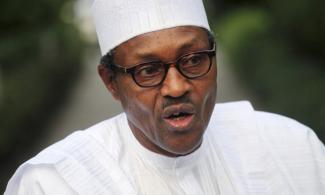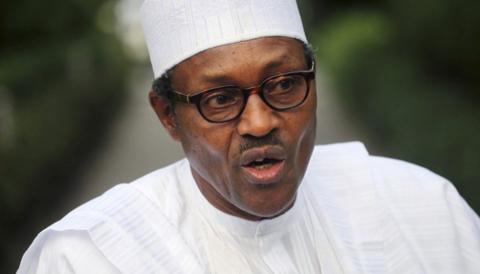
President Muhammadu Buhari has restated his gratitude to Nigerians for his victory at the general elections saying he emerged winner against all odds. Speaking at The Red Media Summit in Lagos, Thursday, Mr. Buhari that he won the election despite the deployment of state forces against him.
President Muhammadu Buhari has restated his gratitude to Nigerians for his victory at the general elections saying he emerged winner against all odds.

Speaking at The Red Media Summit in Lagos, Thursday, Mr. Buhari that he won the election despite the deployment of state forces against him.
“Muhammadu Buhari’s goodwill greetings to you is on account of the fact that he won an election that many people think he was not going to win,” said Garba Shehu, Senior Special Assistant to the President on Media and Publicity, who represented Mr. Buhari.
“Americans say that elections are won on the dollar. It’s very improbable that anybody can win an election without money. We didn’t have advertising money on our campaign. Even when we had little money to spend on advertising, the Nigerian Television Authority was not making available to us slots, neither was AIT.
“I remember on a particular night I called NTA, they had 16 slots of one minute adverts and I said I wanted to buy one minute for the Buhari campaign, they said all 16 had been sold.
“Some other instances that exposed the partisan nature of the NTA. Money was returned to us, from AIT money was returned to us. They simply won’t advertise for us.”
Mr. Shehu expressed the presidency’s gratitude to Statecraft, an arm on The Red Media, for ”selling an unlikely candidate to a very skeptical nation.”
“The day there was a security siege at my home, I woke up to see that my house had been surrounded by armed policemen in the course of the campaign,” Mr. Shehu said.
“In fact it was the cocking of their guns that rose me and my family members from our sleep. Only to discover that tens of policemen, police vehicles, and some other unidentified vehicles darkened our windows around my home.
“The first thing I did was to say ‘Who will help me out of this situation?’ I needed to expose what was going on, and the first man I reached was Adebola Williams of Statecraft. Adebola began to announce on Facebook and Twitter from that moment until the security elements realized that the whole world was looking at what they were doing, because I remained indoors throughout the siege.
“Of course it was much later that we came to know why they had come. Even the APC Presidential Campaign was penetrated by fifth columnists, and I will make this confession, because a day before that siege we had had a meeting with the security committee at which we agreed that we were going to run a story announcing that the National Security Adviser at that time, Mr. Sambo Dasuki, was staging a second coup d’etat against Muhammadu Buhari.
“The former National Security Adviser was involved in a coup that threw out Muhammadu Buhari as military president in 1984.
“This time around, all the things that followed, the postponement of the election on account of this and that and a lot of the thinking of the campaign was that this was yet another coup being hatched by the National Security Adviser and we eventually discovered that this siege on our homes was to pre-empt the story.”
Earlier, Biodun Shobanjo, the Chairman of the occasion, said the media landscape in Nigeria had changed over the decades.
”In 1975, it costs N16 for a billboard advert. Today it is between N7 million and N10 million,” said Mr. Shobanjo, Chairman, Troyka Holdings.
“Between then and now there has been a massive flux resulting from a media flux. In the past it was easy because you had 8-10 media platforms, today, it is so difficult to plan how to reach the consumer.
In 2013, according to Mr. Shobanjo, about N136 billion was spent on advertising in Nigeria – N63.3 billion to TV, N23.5 billion to print media, N20.5 billion to radio, and N23.8 billion to outdoor advertising.
”Those days you knew who your consumers are and what you wanted out of them,” Mr. Shobanjo said.
“If I ran a radio commercial in those days, all I wanted the consumer to do was to participate by taking a buying decision. We made them followers from what we’d beamed to them, and subsequently identify leaders among them that we can use to influence others.
“Today all of that has changed – both from the perspective of those who are in marketing to those who are used to distributing that information.
“Marketers must embrace a world with more uncertainties and must use multiple media vehicles to reach their target markets.”